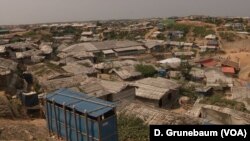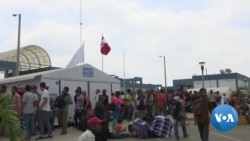ອົງການອົບພະຍົບສະຫະປະຊາຊາດ ຫຼື UNHCR ກ່າວວ່າ ມີປະມານ 71 ລ້ານຄົນ
ໃນທົ່ວໂລກ ພວມຂາດທີ່ຢູ່ອາໄສ ຍ້ອນໄພສົງຄາມ ຖືກປະຫັດປະຫານ ແລະຄວາມ
ຂັດແຍ້ງກັນ. ໃນລາຍງານສະລັບໃໝ່ ໃນວັນພຸດມື້ນີ້ ກ່ອນໜ້າ ວັນອົບພະຍົບໂລກ
ຫຼື World Refugee Day ໃນວັນທີ 20 ມິຖຸນາ ມື້ອື່ນ, ອົງການ UNHCR ກ່າວວ່າ
ນີ້ແມ່ນລະດັບທີ່ສູງທີ່ສຸດ ນັບຕັ້ງແຕ່ ອົງການດັ່ງກ່າວ ໄດ້ສ້າງຕັ້ງຂຶ້ນມາ ເກືອບເມື່ອ
70 ປີ ກ່ອນ. ຊລາຕິກາ ໂຮກ ນັກຂ່າວ ວີໂອເອ ມີລາຍງານເພີ້ມຕື່ມ ຊຶ່ງວັນນະສອນ
ຈະນຳລາຍລະອຽດ ມາສະເໜີທ່ານ ໃນອັນດັບຕໍ່ໄປ.
ມີຜູ້ຄົນຫຼາຍກວ່າ 300,000 ຄົນ ທີ່ໄດ້ໜີພ່າຍຈາກຄວາມຮຸນແຮງເຂັ່ນຂ້າຍ້ອນເຊື້ອ
ຊາດເຜົ່າພັນ ຈາກທາງພາກຕາເວັນອອກສຽງເໜືອຂອງສາທາລະນະລັດ ຄອງໂກ
ນັບຕັ້ງແຕ່ ຕົ້ນເດືອນມິຖຸນາ ເປັນຕົ້ນມາ. ເຈົ້າໜ້າທີ່ຂອງອົງການສະຫະປະຊາຊາດ
ກ່າວວ່າ ມີຜູ້ຄົນຫຼາຍກວ່າ 160 ຄົນ ໄດ້ຖືກສັງຫານ ໃນທີ່ນັ້ນ ລະຫວ່າງປະຊາຄົມ
ພວກກະສິກອນແລະພວກລ້ຽງສັດ ພຽງແຕ່ໃນສັບປະດາຜ່ານມານີ້ເອງ.
ໂຄສົກຂອງອົງການ UNHCR ທ່ານນາງ Babar Baloch ກ່າວວ່າ “ໃນຂະນະທີ່
ມີການອົບພະຍົບລົບໄພ ຍັງສືບຕໍ່ຢ່າງໃຫຍ່ຫຼວງນີ້, ມີຄວາມຢ້ານກົວວ່າ ຈະມີ
ຜູ້ຄົນຫຼາຍກວ່ານີ້ ພະຍາຍາມຊອກຫາທາງເອົາຕົວລອດ ໄປຢູ່ອຸການດາຂ້າມ
ແມ່ນ້ຳແອລເບີຣ໌ຕໄປ.”
ຜູ້ຄົນສ່ວນໃຫຍ່ ຖືກບັງຄັບໃຫ້ອົບພະຍົບລົບໜີອອກຈາກບ້ານເກີດເມືອງນອນ
ແລະຫວັງວ່າຈະໄດ້ກັບຄືນໄປ. ແມ່ນແຕ່ພວກທີ່ໄດ້ໃຊ້ເວລາເກືອບວ່າທັງໝົດຊີວິດ
ຂອງພວກເຂົາ ຢູ່ໃນສູນອົບພະຍົບກໍຕາມ ເຊັ່ນຊາວປາແລັສໄຕນ໌ ໃນຈໍແດນນັ້ນ.
ອົບພະຍົບຊາວ ປາແລັສໄຕນ໌ ຜູ້ນຶ່ງ ທ້າວ Mohammed Diabກ່າວວ່າ “ບໍ່ມີທາງດອກ
ທີ່ພວກເຮົາຈະຍອມແພ້ ປະຖິ້ມບ້ານເກີດເມືອງນອນຂອງພວກເຮົາ ມັນເປັນໄປບໍ່ໄດ້.
ອານຸຊົນລຸ້ນຫຼັງໃນອານາຄົດ ຈະບໍ່ຍອມແພ້ເຊັ່ນດຽວກັນ. ຖ້າພວກເຮົາຕາຍ ມັນກໍຍັງ
ຈະມີພວກອື່ນ, ແມ່ນບໍ່?”
ແຕ່ວ່າ ຈຳນວນພວກຊາວອົບພະຍົບພວກນີ້ ຊຶ່ງຖືວ່າມີຈຳນວນໜ້ອຍ ແລະມີວິກິດການ
ອັນໃໝ່ ໃນການເຂັ່ນຂ້າ ການປະຫັດປະຫານ ອາຊະຍາກຳ ແລະການລະເມີດສິດທິ
ມະນຸດ ໄດ້ສ້າງຄື້ນຟອງໃໝ່ສຳລັບພວກອົບພະຍົບ. ຈຳນວນພວກຜູ້ຄົນທີ່ອົບພະຍົບ
ລົບໜີ ໃນທົ່ວໂລກ ຊຶ່ງກໍມີປະມານເທົ່າກັບປະຊາກອນຂອງປະເທດຝຣັ່ງ ສ່ວນໃຫຍ່
ແມ່ນໄປຈາກອັຟການິສຖານ, ຊີເຣຍ, ຊູດານໃຕ້, ມຽນມາ ແລະໂຊມາເລຍ.
ທ່ານນາງ Ninette Kelley ກ່າວວ່າ “ແລະຕອນທີ່ພວກທ່ານ ມອງເຂົ້າໄປຍັງບັນດາ
ປະເທດພວກນີ້ ພວກທ່ານຈະສາມາດເຫັນທັງສອງປະເທດຈາກອັຟການິສຖານ
ແລະໂຊມາເລຍ ແມ່ນໄດ້ມີການອົບພະຍົບລົບໜີ ຊ້ຳແລ້ວຊ້ຳເລົ່າ ໃນຮອບ 40 ປີ
ຜ່ານມາ.”
ທ່ານນາງ Kelley ແມ່ນຜູ້ອຳນວຍການຂອງອົງການ UNHCR ໃນຫ້ອງການທີ່
ນະຄອນນິວຢອກ. ທ່ານນາງໄດ້ບອກວີໂອເອວ່າ ການປະຫັດປະຫານຊົນກຸ່ມນ້ອຍ
ໃນບາງປະເທດ ເຊັ່ນເອທິໂອເປຍ ແລະກາມາລູນ ທີ່ຍັງຜົນໃຫ້ມີການອົບພະຍົບລົບໜີ
ພາຍໃນປະເທດ ຊ້ຳແລ້ວຊ້ຳອີກ, ແຕ່ວ່າ ບາງວິກິດການອັນໃໝ່ນີ້ ໄດ້ມີຂຶ້ນໃນຫວ່າງ
ມໍ່ໆມານີ້.
ທ່ານນາງ Kelley ກ່າວວ່າ “ແລະເລື້ອງທີ່ໃຫຍ່ກວ່ານີ້ ແນ່ນອນ ແມ່ນຢູ່ໃນເວນີຊູເອລາ
ນັບຕັ້ງແຕ່ປີ 2015 ເປັນຕົ້ນມາ, ຊຶ່ງມີປະມານ ຫຼາຍກວ່າ 4 ລ້ານຄົນ ໄດ້ລົບໜີ.”
ທ່ານນາງ Kelley ໄດ້ກ່າວວ່າ ໃນໂຄລອມເບຍ ປັດຈຸບັນນີ້ ໄດ້ມີຜູ້ຄົນ 1 ລ້ານ 3 ແສນ
ຄົນ ໄດ້ລົງທະບຽນຈາກເວນີຊູເອລາ ແລະເປຣູ ມີປະມານ 800,000 ຄົນ. ເທີກີ ເລບານອນ
ແລະຈໍແດນ ແມ່ນມີຊາວອົບພະຍົບຊີເຣຍ ຫຼາຍທີ່ສຸດ.
ບາງປະເທດ ແມ່ນໄດ້ຮັບເອົາພວກອົບພະຍົບຕ່າງຊາດ ໃນຂະນະທີ່ ພວກເຂົາເຈົ້າ
ຈະມີການປະຫັດປະຫານພາຍໃນ ຂອງປະຊາຊົນໃນທ້ອງຖິ່ນຢູ່ກໍຕາມ.
ທ່ານນາງ Kelley ກ່າວວ່າ ອົບພະຍົບລົບໜີບ້ານເກີດເມືອງນອນຂອງພວກເຂົາເຈົ້າ
ນັ້ນ ແມ່ນພຽງທາງເລືກສຸດທ້າຍ ຕອນທີ່ພວກເຂົາເຈົ້າຢ້ານກົວເພື່ອລອດຊີວິດ ແລະນີ້
ທ່ານນາງກ່າວວ່າ ແມ່ນເຫດຜົນຂອງການອົບພະຍົບ ຢ່າງຫຼວງຫຼາຍ ໃນອາເມຣິກາກາງ
ຕາມຊາຍແດນສະຫະລັດ ແລະເມັກຊິໂກ.
ທ່ານນາງ Kelley ກ່າວວ່າ “ມັນແມ່ນຢູ່ໃນສະຖານະການ ບ່ອນທີ່ເພື່ອນບ້ານ ຫຼື
ພວກເພື່ອນບ້ານທັງຫຼາຍ ຖືກຄວບຄຸມໂດຍ ພວກອັນຕະພານ ແລະບ່ອນທີ່ທາງເລືອກ
ຂອງພວກຜູ້ຊາຍໄວລຸ້ນ ແມ່ນເຂົ້າເປັນສະມາຊິກແກ້ງແລະຂ້າຟັນລັນແທງພວກອື່ນ
ຫຼືບໍ່ ກໍຂ້າຕົວເອງຕາຍ. ແລະສຳລັບຍິງສາວໄວລຸ້ນ ກໍຈະຖືກຊັກຊວນໃຫ້ເຂົ້າໄປ
ໃນກຸ່ມດັ່ງກ່າວ, ທ່ານກໍຊາບດີ, ການຄ້າມະນຸດ ຫຼືບໍ່ ກໍຖືກຂົ່ມຂືນຊຳເລົາ.”
ລາຍງານສະບັບນຶ່ງຂອງອົງການສະຫະປະຊາຊາດ ໄດ້ຊຸກຍູ້ໃຫ້ປະຊາຄົມນາໆຊາດ
ລົງທຶນເຂົ້າໃນການເສດຖະກິດ ແລະຄວາມປອດໄພຂອງພວກປະເທດທັງຫລາຍ ທີ່ຜູ້ຄົນ
ຖືກບັງຄັບໃຫ້ອົບພະຍົບລົບໜີໄປ.
The U.N. refugee agency says nearly 71 million people around the world are displaced by war, persecution and conflict.In a new report issued Wednesday ahead of World Refugee Day on June 20, the UNHCR says this is the highest level ever reached since the agency was established nearly 70 years ago.VOA's Zlatica Hoke has more.
More than 300,000 people have fled ethnic violence in northeastern Democratic Republic of Congo since early June.U.N. officials say more than 160 people were killed in clashes there between farming and herding communities in just the past week.
Babar Baloch, UNHCR Spokesperson
"As the displacement continues at this massive scale, fears are more people will try to seek safety in Uganda crossing Lake Albert."
Most people who are forced to leave their homes hope to come back. Even those who have spent much of their lives in a refugee camp, such as this Palestinian in Jordan.
Mohammed Diab, Palestinian refugee
"There is no way we will give up on our homeland, this is impossible. The future generations will not give it up. If we die, there are others, right?"
But the number of those who return are relatively small and new conflicts, persecutions, crime and human rights abuses create new waves of refugees. The current number of displaced people worldwide roughly equals the population of France. Most of them are from Afghanistan, Syria, South Sudan, Myanmar and Somalia.
Ninette Kelley, UNHCR New York
"And when you look at those countries, you can see that both Afghanistan and Somalia have had re-occurring displacement for over 40 years."
Ninette Kelley is the director of UNHCR's New York office. She told VOA that tribal clashes in some countries like Ethiopia and Cameroon cause repeated internal displacement, but some developments are more recent.
Ninette Kelley, UNHCR New York
"And then the other big story of course has been Venezuela where, since 2015, over 4 million people have fled."
Kelley said Columbia now has 1.3 million registered Venezuelans and Peru about 800,000. Turkey, Lebanon and Jordan house the most Syrians.
Some countries host foreign refugees while their internal clashes cause displacement of local populations.
Kelley said most people flee their homes only as a last resort when they fear for survival, and this, she said, is the main reason for a large influx of Central Americans at the U.S.-Mexico border.
Ninette Kelley, UNHCR New York
"There are very gripping accounts of situations where neighbors or neighborhoods are controlled by rival gangs and where the choice for a young male is either join a gang and murder others or you'd be murdered yourself. And for a young woman it can be conscripted into, you know, trafficking or sexual abuse."
The U.N. report urges the international community to invest in the economy and security of the countries whose people are forced to flee.






